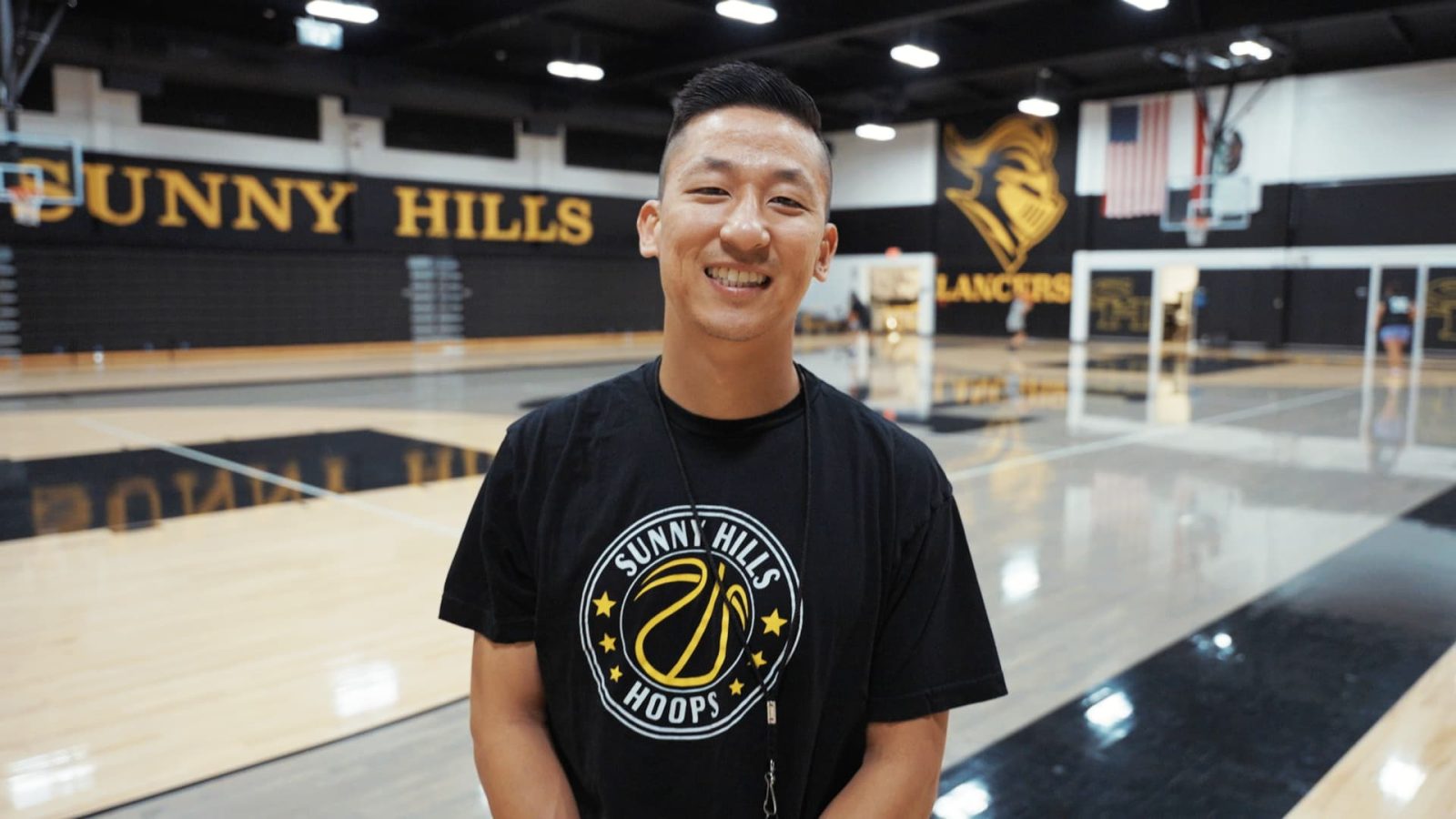This story is part of CNBC Make It’s Millennial Money series, which details how people around the world earn, spend and save their money.
Jae Byun loves his job as a high school math teacher and basketball coach. And he makes six figures doing it.
But he didn’t always plan to pursue a career in education.
While attending the University of California, Irvine, Byun majored in business economics with plans to eventually work in the financial industry. However, after completing a number of internships within that field, he changed his mind.
“As I was going through those internships and going through those experiences, I just found myself wanting something different,” Byun tells CNBC Make It.
Jae Byun, 31, earns around $115,000 teaching math and coaching basketball at a high school in Orange County, California.
Tristan Pelletier | CNBC Make It
In 2013, during his senior year of college, Byun accepted a position coaching football at his former high school in Orange County, California. He played varsity football and basketball while he was a student and remembered his coaches telling him teaching is a stable career with good income in their area.
“It wasn’t going to make me a millionaire, but it was going to allow me to have time and freedom. That really appealed to me,” he says.
From that point, decided to pivot toward education.
Now seven years in, the 31-year-old earned $114,099 for the 2021-2022 academic year between teaching and coaching during the school year, teaching summer school and coaching over the summer in California’s Fullerton school district.
“I can see myself teaching for the rest of my life, if I wanted,” he says.
Growing up in Orange County
Byun was born in South Korea and lived there with his parents and sister until he was 4. In 1996, the family immigrated to Fullerton, California, where Byun grew up.
“I’ve been in Orange County pretty much my whole life,” he says.
Byun’s dad works as a truck driver and his mom works at a spa — jobs they’ve held since arriving in the U.S. Byun says watching his parents wake up early and work long hours taught him to value hard work.
Although his parents were always able to provide for him and his sister, they taught them not to take money for granted.
My parents taught me the value of money and that money doesn’t grow on trees.
“My parents taught me the value of money and that money doesn’t grow on trees,” Byun says. “There’s a limited supply of it, so you have to use it wisely and use it towards the things that really matter to you.”
Initially, Byun’s parents weren’t fans of his decision to become a teacher because they thought it was a low-paying job and he would struggle to take care of himself.
“They were a little disappointed at first, but they didn’t really know the rewards and the benefits that also come from teaching,” he says.
However, they’ve come around to the idea. In fact, Byun currently lives with them.
Byun currently lives with his parents and helps pay for household expenses.
Tristan Pelletier | CNBC Make It
He moved out for a stretch of time and lived on his own from November 2021 to March 2022. He says moving back in with his parents has allowed him to save money and help them with household expenses.
“We make this a team effort to pay bills and take care of each other,” he says.
Although he knows he doesn’t have to, Byun pays his parents $800 for rent and helps cover some of the utility bills.
“I’m sure my parents would let me live at home for free because I know that’s how deep their love is for their kids,” he says. “But, for me, I wanted to reciprocate that love.”
Earning six figures as a teacher
Byun didn’t immediately start earning a six-figure salary as a teacher — it took him around six years to get there.
After graduating from UC Irvine in 2014, he spent a year and a half earning his teaching credential from California State University, Fullerton. His parents helped him cover the cost of the program, which was between $15,000 to $20,000 at the time, he says. He promised to pay them back and is proud that he’s been able to fulfill that promise.
“It felt really good. My parents initially tried to be defensive and say, ‘We don’t need it, we don’t want it’,” he says. “I just kind of forcefully gave it to them and I could tell that that really meant a lot to them.”
Byun began teaching at his old high school in 2016. While teaching, he also earned a master’s degree in educational administration in 2018 from Concordia University.
He earned $59,000 his first year, but knew his salary would go up over time.
Like most public school systems, Byun’s school district pays teachers according to a salary schedule. This information is public and shows how much teachers can expect to earn for each year they complete.
Byun is only paid for the 10 months out of the year when school is in session. For the two summer months, he taught summer school and coached summer programs.
In addition to his base salary as a teacher, Byun earns a stipend for coaching the girl’s basketball team.
Tristan Pelletier | CNBC Make It
For the 2021-2022 school year, his base salary was around $102,000. Byun’s school district also paid him a $4,500 stipend for coaching basketball, and he earns extra income teaching and coaching over the summer.
His nearly $115,000 annual income is more than many teachers in the U.S. earn. On average, teachers in California earn about $88,000 a year, according to the National Education Association, while teachers in Mississippi bring in around $48,000 annually.
“I know some people in other states will look at this salary and be blown away,” Byun says. “But the cost of living in Orange County is the reason why these salaries have increased so much.”
“That was one of the things that got me into trying to work for this district, I knew that this district pays well and it takes care of their employees,” he adds.
I really wanted to take whatever I learned and use my experiences to hopefully help someone else or help some other kid in the future.
But Byun didn’t get into teaching just for a paycheck. He wants to help young people gain life skills and use his own life experiences to inspire the next generation.
“I really wanted to take whatever I learned and use my experiences to hopefully help someone else or help some other kid in the future,” he says.
How he spends his money
Here’s how Byun spent his money in August 2023.
- Retirement savings and investments: $3,156 toward his pension, Roth IRA, savings and other investment accounts
- Discretionary: $2,292 on cash withdrawals and purchasing new couches for his parents
- Housing and utilities: $978 for rent payment to his parents, as well as electricity and gas bills
- Root canal: $579
- Dining out: $564
- Personal loan: $210
- Gasoline: $200
- Subscriptions and memberships: $116 for his gym membership and Spotify subscription
- Car insurance: $80 for his car insurance. His car is paid off.
- Phone: $80 for his and his mom’s phone lines. His sister covers his dad’s phone bill.
Byun aims to save half of his monthly take-home salary. In August, he achieved that, putting more than $3,000 away for the future.
“I know that sounds aggressive, but living at home, I’ve wanted to really take an aggressive approach towards saving and spending,” he says.
As of August, Byun had around $4,300 in a regular savings account and $98,000 in a high-yield savings account, which he’s consistently contributed to since he began teaching. He also has around $30,000 invested in a brokerage account.
Byun says his spending was “a little erratic” in August because he needed an emergency root canal and decided to surprise his parents by buying them two new couches for their birthdays, which both fall in September.
In February, Byun also took out a personal loan for close to $44,000 to purchase solar panels for his parents’ house. He’s on a 20-year payment plan and uses a portion of his paycheck to make monthly payments of around $210.
Looking ahead
In the future, Byun has two main goals: generate multiple streams of income and make sure his parents are taken care of.
“My financial goals are to try to gain a third stream of income and then also be able to provide for my parents when they retire because I know they’re a couple of years away from retirement,” he says.
He plans to move out of his parents’ house within the next six to 12 months, but wants to take full advantage of the time he has left there.
“It’s time for me to go,” he says. “But I’m going to try to maximize that time with them. And not just the time, but also the amount of savings and things that I can do while I’m living at my parents’.”
Byun hopes his story and life experiences will inspire others to become teachers as well.
Tristan Pelletier | CNBC Make It
Byun hopes his story will inspire more young people to become teachers and show them it’s possible to earn a good income while doing so.
“Teaching is a great profession,” he says. “We need good teachers and good coaches back in our education system.”
What’s your budget breakdown? Share your story with us for a chance to be featured in a future installment.
DON’T MISS: Want to be smarter and more successful with your money, work & life? Sign up for our new newsletter!
Want to earn more and land your dream job? Join the free CNBC Make It: Your Money virtual event on Oct. 17 at 1 p.m. ET to learn how to level up your interview and negotiating skills, build your ideal career, boost your income and grow your wealth. Register for free today.
Read the full article here









Leave a Reply